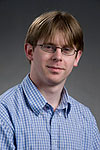Justin Evans wins 2010 Tollestrup Award
 |
| Justin Evans |
When Justin Evans began working on the MINOS experiment in 2004, he didn't expect that he'd be involved in two leading neutrino results. But six years later, Evans is now convening working groups on the MINOS experiment's world-leading measurements of the muon-neutrino and antineutrino oscillation parameters.
"It is great that the committee recognizes the work we've done is important," Evans said.
The Tollestrup Award is given annually for outstanding work conducted by a postdoctoral researcher at Fermilab or in collaboration with Fermilab scientists.
Evans, a postdoc at University College London, made significant contributions to the measurement of the larger of the neutrino mass differences, and to the first direct measurements of the muon antineutrino oscillations parameters.
Those measurements influenced the decision for MINOS to take data with an antineutrino beam, a move that is allowing the collaboration to make a much more precise measurement of antineutrino oscillation parameters.
Emanuela Barberis, from Northeastern University and chair of the Tollestrup Award committee, said Evans' work shined in all required areas.
"We had a very competitive group of submissions," Barberis said. "Justin took the lead in measurements that pertain to a fundamental area of neutrino physics. The work he has done in just a few years is reflected very poignantly in his leadership within the collaboration."
The award, which is sponsored by Universities Research Association, Inc., highlights the work Evans has already done and Barberis said it will help him in the future, too. It is important for postdocs to have their contributions recognized at an early stage in their career, Barberis explained.
"This is a huge award to get," Evans said. "And it comes at an exciting time for MINOS, with a number of new results to be released this summer."
-- Rhianna Wisniewski
|